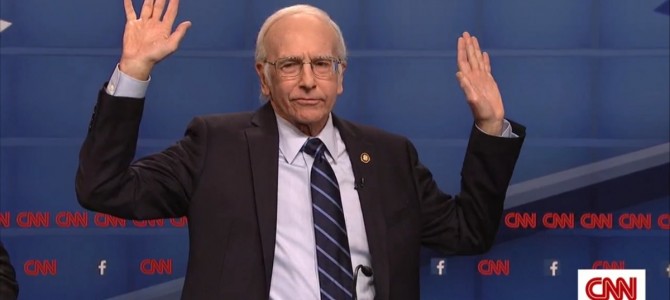
Bernie Sanders has been asking: What is the deal with student loan rates?
It makes no sense that students and their parents pay higher interest rates for college than they pay for car loans or housing mortgages.
— Bernie Sanders (@BernieSanders) October 15, 2015
Sorry, I can’t resist. Ever since seeing Larry David portray Sanders on “Saturday Night Live,” I can’t stop thinking of him as a “Seinfeld” character: Bernie the bewildered old senator. That he is economically illiterate is, I hope, no surprise. He is a socialist, and socialism is an economically illiterate doctrine. So let’s patiently explain it to him.
Why do car loans and mortgages have lower interest rates? They are secured by a tangible asset that can be reclaimed by the lender if the borrower stops paying. The bank can foreclose on your home or repossess your car, so they end up with an asset they can sell to recoup their losses. Rates on these loans are likely to be lower because the lender’s risk is lower. An education, by contrast, is not a tangible asset. It cannot be reclaimed and has no value other than to the person who acquired it. If you stop making student loan payments, they can send you nasty letters and harass you with phone calls. In some cases, they can use aggressive collection techniques. But for the most part, they can’t do much except drag down your credit rating. This is probably why student loan default rates recently spiked to nearly 15 percent (possibly much higher) while mortgage defaults were about half that at the height of the housing market collapse.  So higher risk means higher interest rates. Voila. Economics 101. I don’t pretend that interest rates in this area entirely reflect a free market and the laws of economics. They’re also heavily manipulated by government. But the effect of government interference has been to keep student loan interest rates too low and to make those loans too easy to get. The same thing happened with home loans, and it was a classic case of the Paradox of Subsidies. Lower rates and more loans were supposed to make homes more affordable. But they gave more people more money to spend, something that bid up house prices and encouraged people to build larger and more lavish homes, making them less affordable. This created a treadmill in which the more loans the government subsidized, the more loans people needed to keep up with soaring prices — until the whole thing came crashing down.
So higher risk means higher interest rates. Voila. Economics 101. I don’t pretend that interest rates in this area entirely reflect a free market and the laws of economics. They’re also heavily manipulated by government. But the effect of government interference has been to keep student loan interest rates too low and to make those loans too easy to get. The same thing happened with home loans, and it was a classic case of the Paradox of Subsidies. Lower rates and more loans were supposed to make homes more affordable. But they gave more people more money to spend, something that bid up house prices and encouraged people to build larger and more lavish homes, making them less affordable. This created a treadmill in which the more loans the government subsidized, the more loans people needed to keep up with soaring prices — until the whole thing came crashing down.
The same thing is happening with student loans. For every new dollar in student loans, universities pocket 65 cents in increased tuition. So it seems like government is making college more affordable, but it’s actually making it more expensive. Yes, there is still a lifetime earnings advantage for those who get a degree, though there’s some debate over how much of this is a selection effect. College graduates include the brightest, most ambitious young people, who would do well with or without a formal education. But whatever the advantage of going to college, more and more of it is being drained away by tuition and loans. It’s important to remember what a loan really is. It’s a way of taking future income and making it available to be used today. It moves future value forward to the present, for a price. So what student loans do is to bring some of the student’s future lifetime earnings into the present — and give more of it to the universities, leaving less for the student. While you may still earn more over your lifetime, you’ll also spend more to pay down your student loans, so your university can hire more administrators and build a new stadium. And it’s all because the government decided to “help” you.
Decades ago, politicians decided they wanted to make student loans available in essentially unlimited amounts at subsidized rates to all students, regardless of academic promise or field of specialization. What would make a lot more sense would be to return student loans to the logic of the marketplace. Students going into fields with stronger earnings potential — the average starting salary for a graduate with a degree in electrical engineering is $57,000 — should find it easier to get loans. So should students with strong academic records, who are more likely to graduate and do well. Students who are marginally prepared for college, the ones who are least likely to finish, shouldn’t be encouraged to go into debt for it. Similarly, what if you want to take out loans to finance a degree in sociology or women’s studies or some other field that utterly fails to qualify you for productive work? Try running that up on your credit cards at 24.5 percent because no one else is going to touch it. Nor should they. Making student loans reflect the actual economic value of education wouldn’t just be good for the banks. It would be good for the borrowers, who wouldn’t be encouraged to pile up loans for an education that’s not likely to provide enough economic value in return. Bernie Sanders wouldn’t understand this, but an interest rate is a price. It’s the price of borrowing money, and the purpose of prices in a real economy — a capitalist economy — is to coordinate economic activity and make sure resources go where they are most productive. If the government mucks around with prices, it sabotages that process of coordination, and you end up with problems like empty grocery store shelves. Sanders would know this if he ever bothered to check up on what his socialist utopia looks like in practice.
No hay poder en Venezuela que pueda ocultar esta realidad #AnaquelesVaciosEnVenezuela pic.twitter.com/7y3cLdVHMC” @soyfdelrincon @Pontifex_es — Dennys Cardenas (@dgcardenasl) September 6, 2015
What does it look like when economic activity isn’t coordinated when it comes to higher education? What happens if government policy tries to insulate students from the cost of their education? What happens is that you have kids racking up tens of thousands of dollars of debt without even graduating, or getting a degree that doesn’t qualify them for a job, or spending decades trying to wriggle out from crushing debt.
And then some socialist idiot like Bernie Sanders comes along and complains that the whole system is messed up and needs even fewer price signals, in pursuit of the feeble-minded fantasy that government can decree that everyone should have every good thing, regardless of cost.
This is evidence, not just of ignorance of economics, but of contempt for it.
Follow Robert on Twitter.








